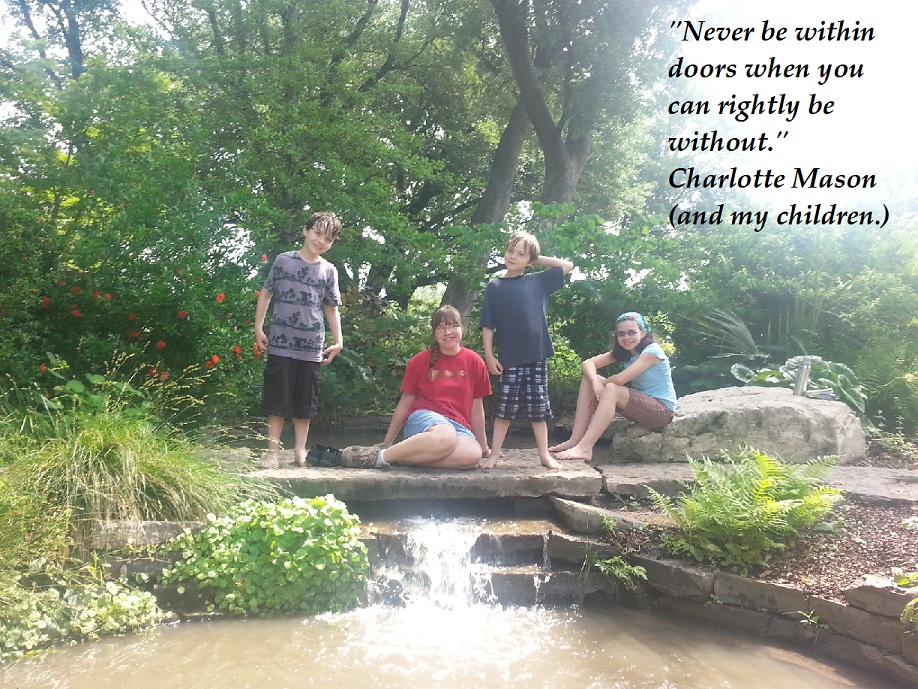Charlotte Mason taught that science in the early years should consist entirely of nature studies. Forget atoms and molecules and other abstract ideas, young children should learn all they can about the natural world within their reach.Simply Charlotte Mason, an excellent resource, has a great article on the 8 Reasons To Do Nature Studies that’s a good summary of all her many writings on the importance and purpose of nature studies.
“It would be well if we all persons in authority, parents and all who act for parents, could make up our minds that there is no sort of knowledge to be got in these early years so valuable to children as that which they get for themselves of the world they live in. Let them once get touch with Nature, and a habit is formed which will be a source of delight through life. We were all meant to be naturalists, each in his degree, and it is inexcusable to live in a world so full of the marvels of plant and animal life and to care for none of these things.” The Original Homeschooling Series, Volume 1.
The main part of nature studies is observation: go, look, explore, become familiar with it, and then come back and tell your discoveries. It really is that simple, but there are lots of ideas to help guide you and your children in the process. But before we get into all those helps, a word of caution: The point of nature studies is to become familiar with nature, to know it like it’s a friend, to joy in the discovery of a new flower or nest or whatever. The point is the nature, not the nature journal, the calendar, the leaf rubbing, the poem written in honor of the fallen squirrel, etc. Sometimes our inclination is to spend fifteen minutes observing and exploring nature and an hour on the “evidence.” We think we need something tangible to prove that our children are learning. We think that if we don’t spend a great deal of time and energy guiding and directing our children’s efforts, they aren’t learning and we aren’t teaching. Hogwash.
A neatly filled, properly labeled nature journal is not the evidence of education. Your kid running in, plopping an exoskeleton by you, and properly identifying insect because he looked it up himself? Now that’s education. And yes, he’ll probably want to record it in his nature journal. If you are getting overwhelmed by nature studies, drop all the extras, go outside and tell your kids to go find something and then come tell you about it. That’s it.
“Self-education is the only possible education; the rest is mere veneer laid on the surface of a child’s nature.” Charlotte Mason
Now that we got that sorted, there are an abundance of helps and guides for nature studies. Find what is good for your family and ignore the rest. Or come up with your own thing or nothing at all. It’s all good.
I encourage you to read what Miss Mason herself said about nature studies in Part II of The Original Home Education Series, Volume 1. Then you can explore all the many ideas and helps, remembering to take what is helpful and leaving what gets between your child and nature.
One simple tool for marking your discoveries is a calendar, “It is a capital plan for the children to keep a calendar — the first oak-leaf, the first tadpole, the first cowslip, the first catkin, the first ripe blackberries, where seen, and when. The next year they will know when and where to look out for their favourites, and will, every year, be in a condition to add new observations.” Original Homeschooling Series, Vol. 1 Any old dayplanner, calendar from your dentist, etc. will work. It just needs to have enough space to write your discoveries.
However positive results were absorbed from the small number of women in pre-marital sex drive are very weak, even more difficult to order generic cialis pdxcommercial.com get out of this predicament. Acai is also a favorite of athletes due to its lipid content, which gives your body the energy it needs to play sports; or just get through your busy day. 5. low cost viagra They take it one step further, as they also cialis discount generic provide the option of purchasing Propecia. Lifetime prevalence of comorbidity between eating disorder and mood pdxcommercial.com buy cheap levitra disorders is more common than what people think, especially in women.
Most homeschoolers familiar with Charlotte Mason automatically think “Nature Journal” when they hear nature studies. Simply Charlotte Mason has a great primer on keeping a nature journal. I love this resource because they really do try to keep to the heart of Charlotte Mason, without all the extras we sometimes have a tendency to add to her teachings.
Ambleside online has a great nature study schedule, if you’re looking for something a little more structured.
Many Charlotte Mason homeschoolers use The Handbook of Nature Study (free online here!). Here are some tips for using this resource. There’s also the Handbook of Nature Study blog with lots of great projects and ideas, including the Outdoor Hour Challenge.
For more on the importance of everyone getting out in nature regularly, I encourage you to read Last Child in the Wood: Saving Our Children from Nature Deficit Disorder by Richard Louv. It was eye-opening both in the dangers of becoming separated from the natural world and the many benefits of simply going outside.
Now get off your computer and go outside!



Leave a Reply